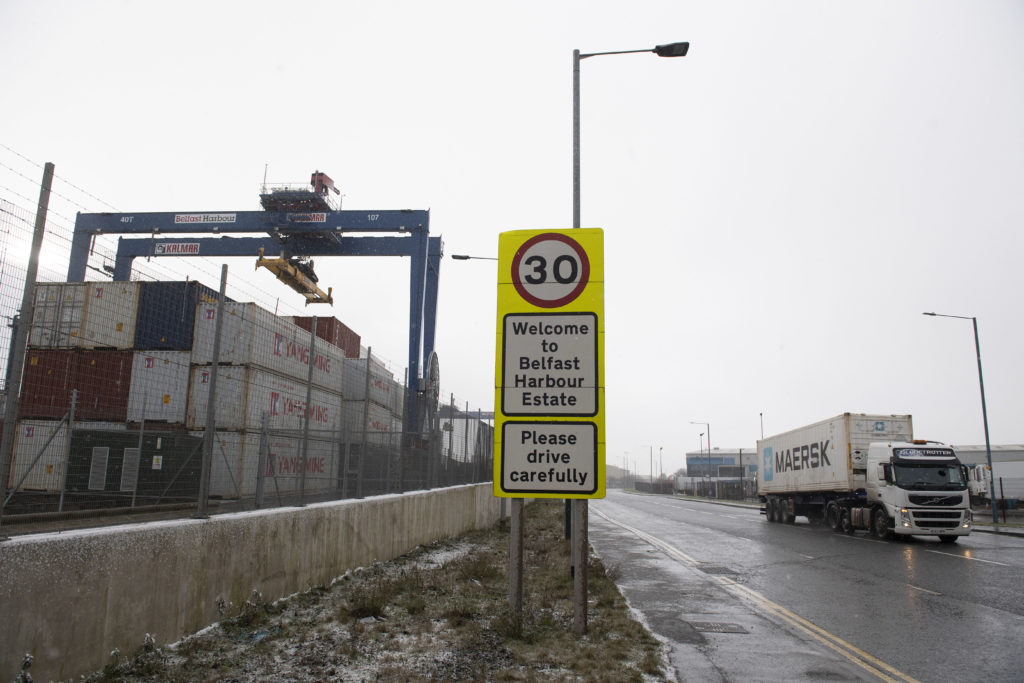NEW rules regarding goods arriving in Northern Ireland from Britain have come into effect.
The new green and red lane system, which went live on October 1, marks the first part of the post-Brexit Windsor Framework deal to be implemented since it was agreed by the British Government earlier this year.
The agreement, which was signed off by British Prime Minister Rishi Sunak and European Commission President Ursula Von Der Leyen in February, keeps Northern Ireland inside the EU's single market for goods, unlike the rest of the UK.
It was designed to offer a “new way forward” on the ongoing issues that Britain’s exit from the EU has caused in the North.
As of Sunday, lorries arriving at ports in Northern Ireland who are transporting goods for sale only in Northern Ireland are eligible to use a new green lane.
This will see them complete minimal paperwork and requires no routine physical checks.
Lorries carrying goods due to travel onwards, across the border into the Republic of Ireland and into the European Single Market, will use the new red lane.
They will be expected to complete full customs paperwork and may be checked as and when they arrive at ports during their journey.
All businesses who wish to use the green lane must register with the British government as a ‘trusted trader’ under the UK Internal Market Scheme.
They can avail of an extended Trusted Trader Support Service which the government has extended until December 2024 to “help businesses of all sizes successfully navigate changes to the way goods move under the Windsor Framework”.
 New green and red lanes are now in effect at ports in Northern Ireland
New green and red lanes are now in effect at ports in Northern IrelandFurther changes now implemented under the Framework will be seen in the labelling of food products.
Meat products and fresh milk that arrives at Northern Ireland ports will now have to be labelled "Not for EU", as these goods can only be sold in the North.
Northern Ireland Secretary Chris Heaton-Harris, who visited Birkenhead Port in Liverpool on October 1, said it was “great to visit as the new green lane comes into effect”.
“We discussed the goods that are now able to travel smoothly between Northern Ireland and Great Britain, the opportunities this provides for boosting NI trade and how we can build on the unique advantages the Windsor Framework offers,” he added.
Mr Heaton-Harris further said that it was now time to “get on with business” in the North, a nod to the DUP’s continued blockade of power-sharing at Stormont.
“I say to my friends in the unionist community we will continue working to answer your remaining concerns,” he said in his opening speech at the Conservative Party Conference in Manchester.
“Progress has been made and we are working in a constructive spirit,” he added, regarding the government’s ongoing discussions with the DUP.
This week Sinn Féin MLA Declan Kearney applauded the implementation of the Windsor Framework at ports in Northern Ireland.
“I welcome the commitment given by both the British government and the EU that they will fully implement the Windsor Framework in a faithful way,” he said, before calling on the DUP to end their boycott.
“It’s now time to move forward,” Mr Kearney said.
“We now have unprecedented economic opportunities to strengthen our economy and create more and better jobs.
“We need to see the assembly and executive working now to address the problems in our health service and deliver for business, for workers and families.
“The public’s patience has run out. The boycott of the Assembly by one party must end now.”
The devolved government in Northern Ireland has now been out of action since February 2022.

